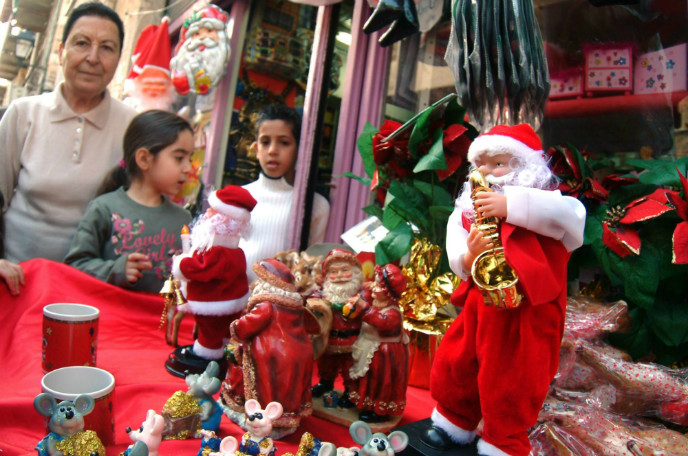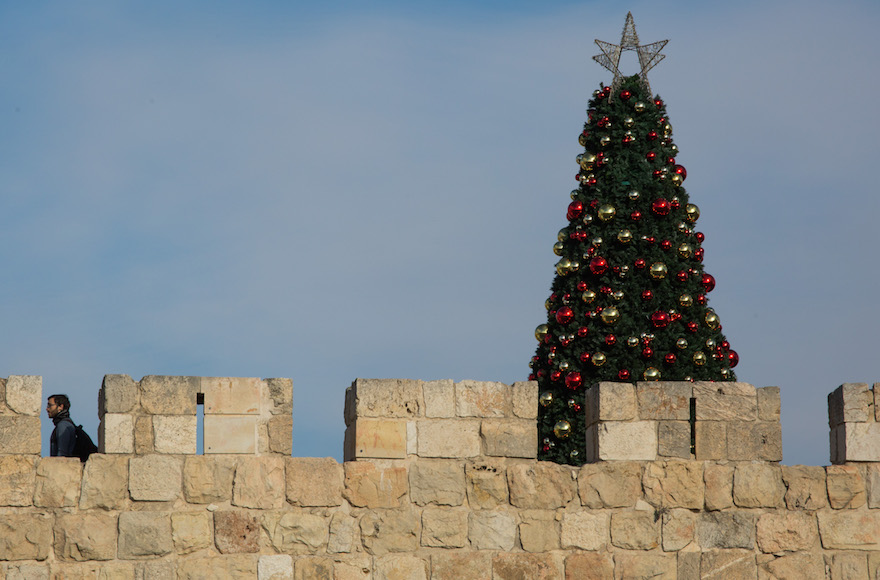Out damn tree

Shopping for Christmas trees and glitter in Tel Aviv. The shop has been repeatedly heckled for selling these emblems of Christmas. Photo by Ben Sales/JTA
Israeli rabbis launch war on Christmas tree
Jerusalem hotels receive warning letter noting that Jewish religious law forbids Christmas trees and new year’s parties
By Jonathan Cook, his blog and Al Jazeera
December 23, 2016
As tens of thousands of Christian pilgrims converge on the Holy Land this week to celebrate the birth of Jesus, senior Israeli rabbis have announced a war on the Christmas tree.
In Jerusalem, the rabbinate has issued a letter warning dozens of hotels in the city that it is “forbidden” by Jewish religious law to erect a tree or stage new year’s parties.
Many hotel owners have taken the warning to heart, fearful that the rabbis may carry out previous threats to damage their businesses by denying them certificates declaring their premises to be “kosher”.
In the coastal city of Haifa, in northern Israel, the rabbi of Israel’s premier technology university has taken a similarly strict line. Elad Dokow, the Technion’s rabbi, ordered that Jewish students boycott their students’ union, after it installed for the first time a modest Christmas tree.
He called the tree “idolatry”, warning that it was a “pagan” symbol that violated the kosher status of the building, including its food hall.
About a fifth of the Technion’s students belong to Israel’s large Palestinian minority.

Issa Kassissieh, a former professional basketball player, is Jerusalem’s Santa Claus. Photo by Jessica Steinberg/Times of Israel
While most of Israel’s Palestinian citizens are Muslim, there are some 130,000 Christians, most of them living in Galilee. Other Palestinian Christians live under occupation in East Jerusalem, which Israel has annexed in violation of international law.
“This is not about freedom of worship,” Dokow told the Technion’s students. “This is the world’s only Jewish state. And it has a role to be a ‘light unto the nations’ and not to uncritically embrace every idea.”
Rabea Mahajni, a 24-year-old electrical engineering student, said that placing the tree in the union was backed by Palestinian students but had strongly divided opinion among Jewish students and staff. The majority, he said, were against the decision.
“One professor upset [Palestinian] students by taking to Facebook to say that the tree made him uncomfortable, and that those who wanted it should either put one up in their own home or go to Europe,” he told Al Jazeera.
Mahajni added: “This is not really about a Christmas tree. It is about who the tree represents. It is a test of whether Jewish society is willing to accept an Arab minority and our symbols.”
He pointed out that Palestinian students had not objected to the students’ union also marking Hanukkah, referring to the Jewish winter “festival of lights” that this year coincides with Christmas.
Interest in Santa hats
For most of Israel’s history, the festive fir tree was rarely seen outside a handful of communities in Israel with significant Christian populations. But in recent years, the appeal of Christmas celebrations has spread among secular Israeli Jews.
Interest took off two decades ago, after one million Russian-speaking Jews immigrated following the fall of the Soviet Union, said David Bogomolny, a spokesman for Hiddush, which lobbies for religious freedom in Israel.
Many, he told Al Jazeera, had little connection to Jewish religious practice and had adopted local customs in their countries of origin instead.
“The tree [in the former Soviet Union] was very popular but it had nothing to do with Christmas,” he said. “Each home had one as a way to welcome in the new year.”
Nazareth, which claims to host the tallest Christmas tree in the Middle East, has recently become a magnet for many domestic tourists, including Jews, Christians and Muslims. They come to visit the Christmas market, hear carols and buy a Santa hat.

Santa hats are particularly popular at Christmas markets, this one in the Wadi Nisnas neighbourhood of Haifa. Photo by Jorge Novominsky/FLASH90
Haifa and Jaffa, two largely Jewish cities with significant Palestinian Christian populations, have recently started competing. Jaffa, next to Tel Aviv, staged its first Christmas market last year.
Meanwhile, hotels are keen to erect a tree in their lobbies as a way to boost tourism revenue from Christian pilgrims, who comprise the bulk of overseas visitors.
‘No danger’ to Judaism
But the growing popularity of Christmas has upset many Orthodox rabbis, who have significant powers over public space. Bogomolny said that some rabbis were driven by a desire to make the state “as Jewish as possible” to avert it losing its identity.
Others may fear that the proliferation of Christmas trees could lure Israeli Jews towards Christianity.
Wadie Abu Nassar, a spokesman for the Latin Patriarch in Jerusalem, said that he had noticed an increasing interest from Israeli Jews in Christian festivals, including in some cases requests to attend Christmas mass.
He told Al Jazeera this was not a threat to Judaism, but healthy curiosity. “If we want to live together in peace, we have to understand each other and learn to trust,” he said.
Tree-free Knesset

A Christmas tree in Jerusalem. The chief rabbis’ request appears to contradict guidelines issued by the Chief Rabbinate in 2015, stating that the kashrut certification of hotels could not be revoked based on music, photography, or the displaying of Christmas trees. The guidelines were implemented in response to a petition by Israeli NGO Hiddush*- For Religious Freedom and Equality, demanding that that the existing regulations be changed. Caption from jp updates, Photo by Nati Shohat/Flash90
The controversial status of Christmas in Israel was underscored four years ago when Yair Netanyahu, the 21-year-old son of Israel’s prime minister, caused a minor scandal by being photographed wearing a Santa hat next to a Christmas tree.
The office of Benjamin Netanyahu hurriedly issued a statement saying that Yair had posed as a joke while attending a party hosted by “Christian Zionists who love Israel, and whose children served in the [Israeli army]”.
Two years earlier, Shimon Gapso, the mayor of Upper Nazareth, originally founded for Jews on Nazareth’s land, banned all signs of Christmas in the city’s public places. He has been a vociferous opponent of an influx of Christians from overcrowded Nazareth.
The Israeli parliament, the Knesset, has also been declared a Christmas tree-free zone.
In 2013, its speaker rejected a request from Hanna Swaid, then a Palestinian Christian legislator, to erect a tree in the building. Yuli Edelstein said it would evoke “painful memories” of Jewish persecution in Europe and chip away at the state’s Jewish character.
Attack on religious freedoms
Swaid pointed to the prominence of Jewish symbols in public spaces in the United States, including an annual Hanukkah party at the White House, during which the president lights menorah candles.
“Israeli leaders expect the US to be religiously inclusive, but then they refuse to practise the same at home,” he told Al Jazeera.
He also noted that the religious freedoms of the Palestinian minority were under ever greater attack, most notably with the recent drafting of a so-called “muezzin bill”, which would crack down on mosques’ use of loudspeakers for the call to prayer.
“Given this hostile political climate, the battle to gain legitimacy for our religious symbols becomes all the more important,” he said. “Otherwise we face a dark future.”
Threat to kosher status
Nonetheless, there has been a backlash, especially from secular Jews, against the rigid control exercised by Orthodox rabbis.
Haifa’s mayor, Yona Yahav, overruled the city’s rabbi in 2012 when he tried to ban Christmas trees and new year’s parties. The Jewish new year occurs several months before the Christian one.
And last year, in the face of a legal challenge from Hiddush, the chief rabbinate backed down on threats to revoke the kosher status of businesses that celebrate Christmas.
But while the ban on Christmas trees has been formally lifted, in practice it is still widely enforced, according to Bogomolny.
“The problem is that the chief rabbinate actually has no authority over city rabbis, who can disregard its rulings, as we have seen with the letter issued by the Jerusalem rabbis,” he said.
Most hotels wanted to ignore the prohibition on Christmas trees because it was bad for business, but feared being punished.
“It is a problem throughout the country,” he said. “The hotels are afraid to take a stand. If they try to fight it through the courts, it will be costly and could take years to get a ruling.”
One hotel manager in West Jerusalem to whom Al Jazeera spoke on condition of anonymity said he feared “retaliation” from the rabbis.
“The letter was clearly intended to intimidate us,” he said. “The Christian tourists are here to celebrate Christmas and we want to help them do it, but not if it costs us our certificate.”
* NOTE
About Hiddush
Imagine a reality: Israel and Judaism in an era of religious freedom and equality
- Imagine an Israel where Judaism blossoms in all its nuanced shades and colors; where religious and secular movements flourish side-by-side and those who explore beyond Judaism in search of meaning are able to forge new spiritual paths within Judaism.
- Imagine an Israel in which every couple is free to marry in their county in the ceremony of their choice, whether religious or civil, and no one has to leave the country in order to wed.
- Imagine an Israel in which anyone who is litigating a dispute before a rabbinic court, or other religious tribunal, is doing so of their own free will; where those who willingly accept the religious authority of the particular religious court are subject to that authority in matters of personal status.
- Imagine an Israel where entry into Judaism is embracing and inclusive. Emigrés from the former Soviet Union who are members of Jewish families are welcomed into the Jewish People. Rabbis of all streams are free to convert individual students who complete appropriate training and demonstrate a sincere desire to enter into the Jewish fold. Where converts feel confident that they will continue to be accepted by the State as Jewish throughout their lives.
- Imagine an Israel in which the State treats all expressions and streams of Judaism and other religions with equal respect and dignity; where the State recognizes the right to freedom of religion and freedom from religious coercion and allocates resources for religious needs in a just and equitable fashion.
- Imagine an Israel in which the duty of military service is shared equally by young Israelis of all Jewish streams; where those entitled to exemption from military service perform national civil service instead; and where an appropriate number of excelling yeshiva students are granted exemption from military service as well as national service and receive financial stipends allowing them to study.
- Imagine an Israel in which the curriculum in all elementary and secondary schools includes mathematics, science, civics, and English. This would afford all parents the opportunity to educate their children in accordance with their own values while advancing societal cohesion, helping to ensure that every student has the capacity to join the workforce and pursue higher education.
- Imagine an Israel that experiences rapid economic growth buoyed by the contributions of a workforce that includes those who have not previously fully participated for reasons of religion or social pressure. Increased revenues would allow the government to invest more in health, education and welfare. The devastating cycle of poverty within those groups and other sectors of Israeli society would finally be broken.
- Imagine an Israel in which gender equality fully guides the state and women are not demeaned or otherwise disadvantaged based on religious dictates on public bus lines, in proceedings regarding personal status, at the Western Wall and in other public venues and services.
- Imagine an Israel in which religious authorities from each of the streams of the Jewish people may issue certifications of Kashrut; where standards of halacha include concerns for the welfare of workers, animals and the earth.
- Imagine an Israel where public transportation will be available for all who desire it, including the disabled, the infirm, the elderly and the young; and this transportation will be designed with respect and deference for the unique character of Shabbat.
- Imagine an Israel where funerals and burials are available throughout the country that honors diverse religious traditions and includes gender separation and gender equality as well as civil options.
- Imagine an Israel where the State engages in the respectful and dignified removal and reburial of remains from ancient graves discovered during work on public roads and development projects; where such removal and reburial are conducted in accordance with appropriate religious standards of the relevant faith.
- Imagine the quality of life that Israel can achieve when it realizes the fundamental promise in its Declaration of Independence, namely to build a society based on the “foundation of freedom, justice, and peace according to the vision of the prophets of Israel,” and the principles of “freedom of religion and conscience.”

